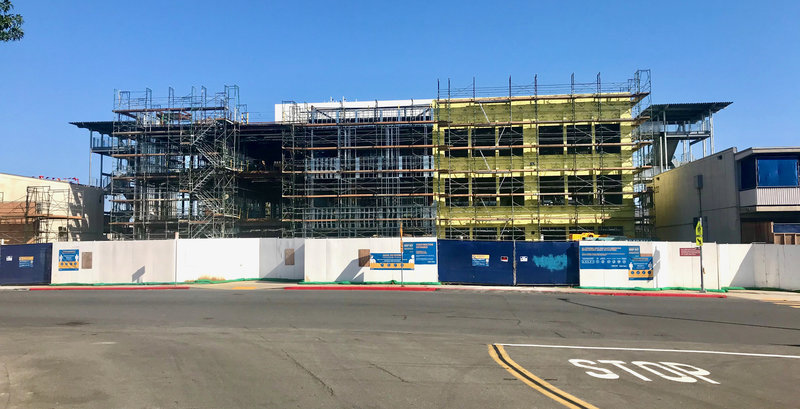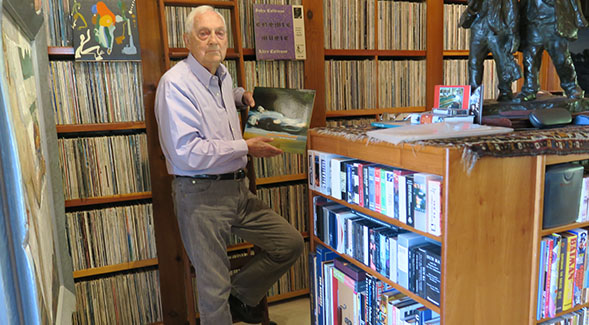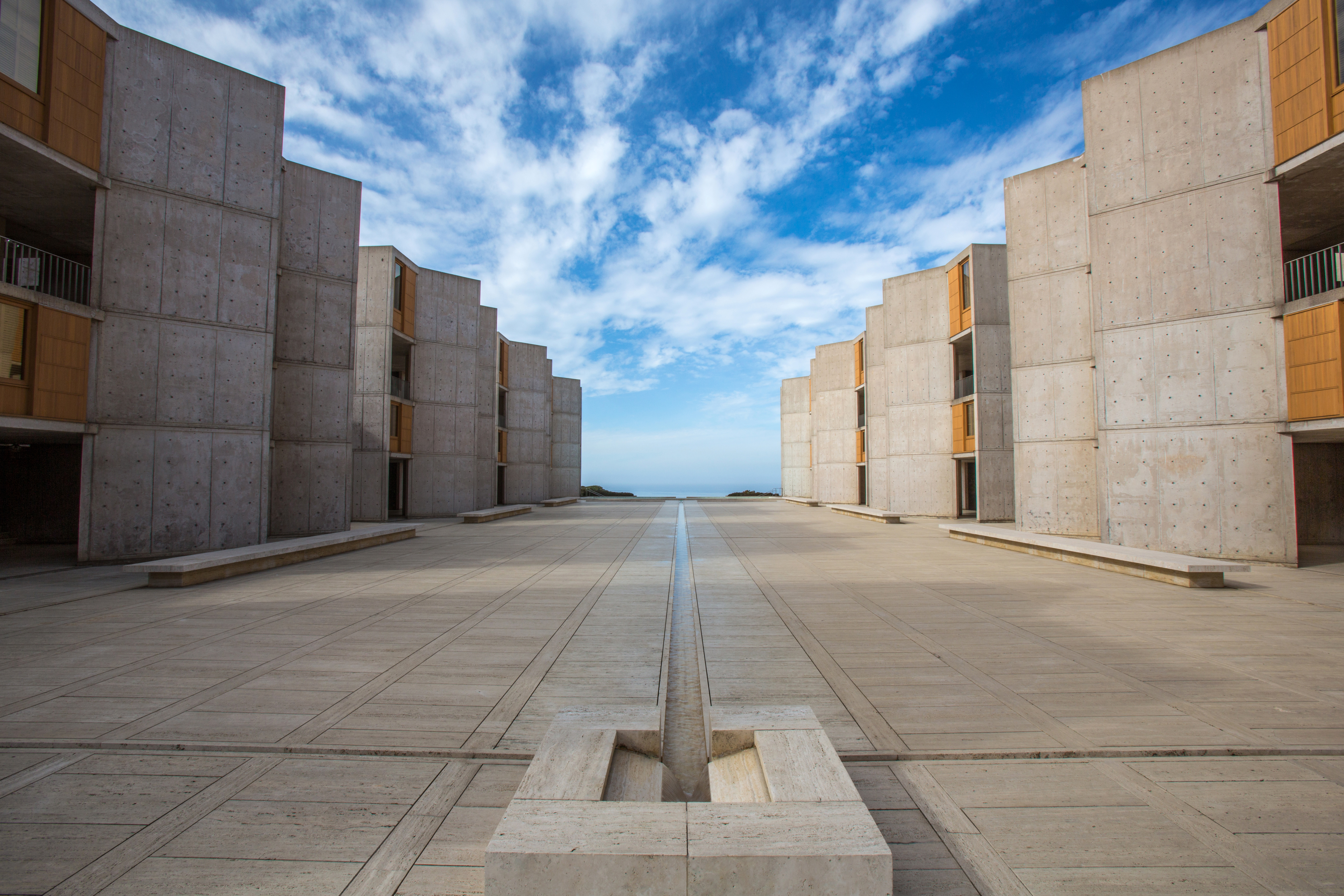Daily Business Report-July 16, 2020
Bram Dijkstra holds one of the vinyl record sleeves from the archive. (Photo courtesy of Bram and Sandra Dijkstra)
Bram and Sandra Dijkstra donate large
collection of jazz music by Black
artists to San Diego State University
By SDSU News Team
One of the largest curated collections of Jazz music by Black artists, to include rarities dating back to the 1920s — it includes works by John Coltrane, Cecil Taylor, Sun Ra, Johnny Hodges and Dizzy Gillespie — is being gifted to San Diego State University.
Abraham “Bram” Dijkstra, a distinguished cultural historian and University of California San Diego professor Emeritus of American and Comparative Literature, and Sandra Dijkstra, a renowned literary agent, entrusted SDSU in the care of the John Coltrane Memorial Black Music Archive. The collection will come to SDSU as part of a planned gift.
The John Coltrane Memorial Black Music Archive, representing nearly 65 years of collection and curation efforts, consists of thousands of vinyl recordings and CDs of some of the most well-known Jazz musicians spanning the early 1920s through the start of the 21st century.
Notably included in the collection, and carrying its namesake, is nearly every known recording of the late and iconic Jazz musician John Coltrane, a Library of Congress-recognized artist and Grammy Hall of Fame inductee. Much of Coltrane’s work is required for study by musical students nationally.
___________________________________
San Diego universities, biotechs relieved
Trump won’t try to deport foreign students
San Diego County universities, which deeply rely on international students for tuition, talent and diversity, collectively exhaled Tuesday after the Trump administration rescinded a rule that could have driven thousands of foreigners out of the country.
The news also elicited relief in the region’s huge biomedical research community, which depends on current and former international students to help develop everything from drugs to treat COVID-19 to new ways to image the brain.
___________________________________
EvoNexus launches 5G incubator program with
sponsorship from Qualcomm Inc.
EvoNexus, California’s nonprofit technology incubator for startups, announced the launch of its 5G incubator program, in collaboration with Qualcomm Inc. as a sponsor of the program, to assist early-stage companies helping to build the wireless 5G ecosystem. Qualcomm and EvoNexus have a 10-year history of collaboration and success in supporting early stage ventures impacting the wireless ecosystem.
“5G will drive transformation across industries, fueling a new era of innovation. Qualcomm companies are developing innovative solutions across the entire 5G value chain and are committed to support the roll out and adoption of 5G,” said Brian Modoff, executive vice president, strategy, M&A and ventures, at Qualcomm. “5G is poised to produce $13.2 trillion in economic value by 2035 and we want to ensure that the full potential of 5G is met. Through our EvoNexus sponsorship, we will be supporting early-stage ventures developing new use cases that leverage 5G’s unique capabilities.”
___________________________________
Fluid Sound uses new technology
to help the Southwest reopen safely
Businesses and public spaces everywhere are looking for ways to reopen safely. San Diego-based Fluid Sound, an audio-visual design and installation company, is collaborating strategically with leaders in technology including OneScreen and leveraging solutions from industry leaders including Qualcomm Technologies Inc. to facilitate and support communities to reopen safely.
For local businesses, Fluid Sound installed GoSafe, a body temperature and facial recognition scanner with built-in AI and live on-screen help. GoSafe supports smooth operations at any point of entry by scanning for signs of fever and verifying that everyone who enters is wearing a mask.
___________________________________

New classroom building
taking shape at Point Loma High School
A new three-story classroom building is taking shape on the campus of Point Loma High School as other projects await future phases.
The academic edifice, costing “more than $10 million,” according to the San Diego Unified School District facilities project website, is part of an overall site modernization project using funds from Props. S and Z, passed by voters in 2008 and 2012 respectively.
The new structure has a scheduled completion date of January 2021.
Fronting Chatsworth Boulevard, students will have 20 new state-of-the-art classrooms, a spacious new media center, restrooms, and the electronic brains of the school to include an already functioning “Voice Over Internet Protocol” telephone system, computer mainframes and connections along with electrical power equipment.
A new media center will include artwork and other features re-purposed with wood saved from the beloved Torrey Pines trees that were removed to make room for the new structure.
A new student quad with landscaping and decorative concrete will become a centerpiece to the campus.
As requested by PLHS parents and community members, SDUSD is building a wall along Chatsworth Boulevard that will feature arches similar to those that gave the original campus its beautiful appearance.
___________________________________
Autism researchers map brain
circuitry of social preference
Some individuals love meeting new people, while others abhor the idea. For individuals with conditions such as autism, unfamiliar social interactions can produce negative emotions such as fear and anxiety. A new study from Scripps Research reveals how two key neural circuits dictate the choice between social approach and avoidance.
___________________________________
City of San Diego to resume full enforcement
of all parking regulations on Aug. 1
The City of San Diego will resume full enforcement of all parking regulations beginning on Aug. 1, part of an effort to support local businesses and continue essential operations during the COVID-19 pandemic.
Identified as one small step toward restoring San Diego’s economy, restarting parking enforcement will allow for increased turnover of customers in businesses districts and ensure accessibility for patrons. Parking enforcement resumed on July 1 with a warning period, during which violators received written warnings.
The city suspended citations for vehicles violating street sweeping parking restrictions, metered parking, time limits and yellow commercial zones on March 16 after the state and county stay-at-home order went into effect.
___________________________________
San Diego Foundation awards record $3.3 million
to more than 1,000 students pursuing college
The San Diego Foundation announced $3.3 million in scholarships to more than 1,000 students who will be attending college during the 2020-2021 school year. Among the new 2020 recipients, 63 percent are first-generation college students and 83 percent are from low-income households, based on Expected Family Contribution data.
___________________________________
General Atomics and UK sign contract
for Protector RPAS production
General Atomics Aeronautical Systems Inc. (GA-ASI) has signed a contract with the UK Ministry of Defence for the manufacture and delivery of Protector RG Mk1 Remotely Piloted Air Systems (RPAS).
“This is a major milestone for the MQ-9B system and the Protector Program,” said Linden Blue, CEO. “We look forward to delivering this new generation of MQ-9 to the Royal Air Force.”
MQ-9B SkyGuardian is the baseline system that will become the Protector RG Mk1 when configured for the RAF. This configuration includes X-band satellite communications and UK weapon systems.
The contract covers a total of 16 aircraft (initial order of three platforms with an option for an additional 13) and seven Ground Control Stations, together with associated ground support equipment. The first system will be delivered in 2021, though it will remain in the U.S. to be utilized in the test and evaluation program.
“Protector will be deployed in wide-ranging Intelligence, Surveillance, Target Acquisition and Reconnaissance operations where its ability to fly consistently for up to 40 hours will offer a vastly improved ISTAR capability. Given that it is designed to fly in non-segregated, civil airspace, the Protector RPAS will also be able to support multiple civilian missions, including search and rescue and disaster response missions,” said Group Captain Shaun Gee, the RAF’s director Air ISTAR Programmes.
___________________________________
San Diego County Credit Union returns
as sponsor of virtual LGBT Pride celebration
San Diego County Credit Union is returning as a sponsor of the LGBT Pride celebration, being held virtually Friday and Saturday on sdpride.org, Facebook and YouTube.
On Friday, the Spirit of Stonewall Rally will recognize and honor leaders who are working hard to preserve the gains and meet the challenges still facing the LGBTQ+ community. The live-streamed version will incorporate live and pre-recorded segments of this year’s honorees that are inspirational, educational and entertaining.
Saturday will be the virtual Pride 5K allowing runners to choose their own path and upload their time and photos online. The feature event is the exciting all-day livestream showcasing everything that makes Pride a uniquely special experience. The event will highlight community leaders, organizations, entertainers, elected officials, businesses and A-list celebrities, all from the safety and comfort from your home or mobile device.
___________________________________

Commentary
California could lose one, maybe two
congressional seats from 2020 census
By Dan Walters | CalMatters Columnist

The year is scarcely half over and California is experiencing an unprecedented wave of traumatic events, to wit:
—A pandemic that has infected hundreds of thousands of Californians and already has claimed more than 7,000 lives;
—A very severe recession, spawned by the pandemic, that has erased millions of jobs and has hammered state and local government budgets; and
—Civil and political unrest over how people of color, 60 percent-plus of the residents of this politically blue state, are treated.
All three matters congeal in something else that’s happening, albeit in less dramatic fashion: the decennial census that not only counts Californians but sets the stage for divvying up political power for the next decade.
Even before the triumvirate of crises erupted, California officials were worried about the census. They knew that California’s very slow population growth put it on the bubble for losing one of its 53 congressional districts. They were also concerned that conducting the census mostly via the Internet could lead to an undercount because of the state’s large immigrant community, its high level of poverty and its many languages.
The state’s last population estimate, issued in May, was a net gain of just 87,984 in 2019. A declining birthrate, an increasing death rate, low immigration from other countries and a net loss of population in state-to-state movements contribute to near-zero growth.
Anew analysis of population trendsby Claremont McKenna College’s Rose Institute concludes that it’s certain California will lose one congressional seat and could easily lose two “if California’s COVID-impaired 2020 Census count lags behind other states.”
“California has never experienced the political shock of losing a congressional district —much less two,” researcher Douglas Johnson said. “Losing seats inevitably triggers political infighting and the long-term loss of voices and influence in Washington. The possibility of saving at least one of those seats should inspire state leaders and residents to redouble their efforts to ensure every California resident is counted in the 2020 census.”
The analysis also concluded that coastal Southern California, which has been growing more slowly than the state as a whole, would likely be the big loser if, indeed, the state’s congressional delegation shrinks.
That depends, however, on who’s drawing districts after the census data are released —another point of contention.For the second time,a 14-member independent commission formed by the state auditor’s office from a pool of applicants will draw new maps. When the first eight members were drawn by lot from the pool, there wasn’t a single Latino, and that ignited a storm of criticism since it occurred amidst political and civic angst over how people of color fare in California.Kevin de León, a former president pro tem of the state Senate soon to become a Los Angeles city councilman, was one of the first Latino leaders to declare outrage.
“While members of political parties are guaranteed a seat at this incredibly important table, people of color are not,” de León complained in aSacramento Bee op-ed co-authored by other political figures.
“How could any so-called ‘citizens’ commission’ exclude Latino representation, a population that makes up nearly half of the state’s citizenry? That isn’t how a functioning democracy works, and it certainly should not have happened in a state that is as proud of its progressive values as California has been.”
The commission probably will gain Latino members in the final selection process, but the dustup underscores just how politically touchy even ministerial actions can be in this year of upheaval.
CalMattersis a public interest journalism venture committed to explaining how California’s state Capitol works and why it matters. For more stories by Dan Walters, go to calmatters.org/commentary.




